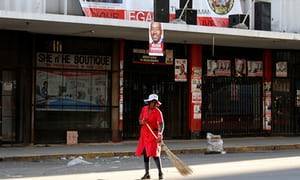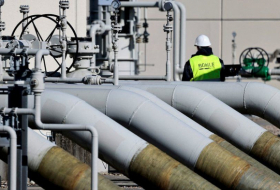Not even 72 hours after polls closed in Zimbabwe’s presidential election – the first following the fall of Robert Mugabe last year and billed as the beginning of a new era for the impoverished country – soldiers patrolled the streets of the capital.
Many shops were closed and traffic remained light on Thursday. Scattered debris, scorch marks from fires and a few dozen soldiers marked the scenes of violence of the day before.
“We are scared. We don’t know what’s going to happen now. I have to earn a living but I would like to be at home now,” said Mildred Masara, a hotel worker in Harare.
“Yesterday was a very sad day for Zimbabwe,” said Gift, minibus taxi driver, glancing over his shoulder as a soldier smoking a cigarette looked on. “We hope things remain quiet and we can all just forget about this election. We don’t know if it was fair. The government will do what they want.”
The army was deployed in the capital on Wednesday after police proved unable to quell demonstrators who claimed Monday’s historic election was being rigged.
In a late-night press conference, the home affairs minister, Obert Mpofu, warned that the government “will not tolerate any of the actions that were witnessed today”.
“The opposition … have perhaps interpreted our understanding to be weak, and I think they are testing our resolve and I think they are making a big mistake,” he said.
By mid-afternoon on Wednesday much of the city centre had resembled a war zone, with military helicopters flying overhead, armoured personnel carriers moving through burning debris and soldiers chasing stone-throwers down narrow streets. A pall of smoke filled the sky. On cracked pavements there was glass and – in some places – blood.
Terrified commuters took cover in shop doorways or behind walls still covered in posters bearing portraits of election candidates as volleys of shots rang out and stones flew through the air. Witnesses reported seeing soldiers beating people with makeshift batons.
The United Nations secretary general, António Guterres, called on Zimbabwe’s political leaders and people to exercise restraint and reject any form of violence. He was joined by the UK Foreign Office minister Harriett Baldwin, who said she was “deeply concerned” by the violence and called on the nation’s political leaders to “take responsibility for ensuring calm and restraint at this critical moment”.
Amnesty International urged authorities to launch “a prompt and effective” investigation into the deadly military crackdown. “People must be guaranteed their right to protest,” said Colm Ó Cuanacháin, its acting secretary general.
Opposition supporters have expressed growing impatience over delays in releasing the results of the historic vote, the first since Mugabe was ousted after four decades in charge.
The scenes of violence contrasted dramatically with the jubilation and joy on the same streets that greeted the end of Mugabe’s rule in November. Then soldiers were seen as patriotic heroes. On Wednesday afternoon, in the opposition stronghold of Harare at least, they were seen once more as thuggish defenders of the ruling Zanu-PF party.
Early clashes took place outside the headquarters of the Zimbabwe Electoral Commission (ZEC), which opposition supporters accuse of bias, and spread rapidly.
“We support [opposition leader Nelson] Chamisa and we want him to be our president. The Electoral Commission is not fair. Our election is being stolen,” said a 19-year-old student among the protesters.
Some chanted “This is war” while others shouted slogans calling for the country’s president, Emmerson Mnangagwa, to step down.
“This is all the government’s fault,” Abigail Nganlo, a 29-year-old nurse, told the Guardian as she sheltered from the clashes in a narrow alley. “We are on our knees with the economic situation. People are so angry. The [election] figures they are producing are fake. Where there are 500 people at a polling station, they are saying 5,000.”
Alex Kamasa, 30, an unemployed graduate, said: “They are desperate. It is a big robbery. At least Mugabe rigged with brains. These guys rig like schoolchildren. They insult us.”
Chamisa, 40, said the presidential election results were fraudulent. “We have won this one together. No amount of results manipulation will alter your will,” he tweeted before the army was deployed.
Priscilla Chigumba, chairwoman of ZEC and a high court judge, has denied allegations of bias and strongly disputed accusations of rigging.
The country’s justice minister, Ziyambi Ziyambi, said the army had been deployed to disperse a violent crowd and restore “peace and tranquility”.
“The presence of the army is not to intimidate people but to ensure that law and order is maintained. They are there to assist the police,” Ziyambi said in an interview broadcast on eNCA television. “They are there as a people’s army to ensure that peace and security prevails.”
The authorities are under increasing pressure to release the results of Monday’s poll, which pitted Chamisa, a 40-year-old lawyer, pastor and leader of the main opposition party the Movement for Democratic Change, against Mnangagwa, 75, a longtime Mugabe aide and head of the Zanu-PF.
Zimbabwe’s rulers know that the widespread perception overseas that they have rigged an election would block the country’s reintegration into the international community and deny it the huge bailout package needed to avoid economic meltdown.
More about:
















































